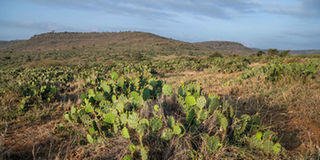Employing collaborative efforts to secure sustainable futures in Kenya
Sponsored by The Nature Conservancy

The invasive Engelmann prickly pear at Loisaba Conservancy, Kenya.
This year’s theme for World Day to Combat Desertification and Drought, ‘United for Land. Our Legacy. Our Future’, underscored the importance of collective action to preserve our planet’s vital land resources for future generations. This is the approach that The Nature Conservancy (TNC) applies in conservation work.
Land is the foundation of our people, wildlife, and biodiversity. The Horn of Africa, including regions within Kenya, has recently experienced some of its worst droughts in decades with severe socio-economic and environmental impacts directly affecting millions of people through loss of livelihoods and increased conflict over diminishing resources. Climate change further exacerbates these issues, posing significant challenges to sustainable land management and agriculture, and undermining ecosystems’ resilience.
Protecting and restoring degraded land is essential to ending poverty and hunger, achieving food security, and improving the livelihoods of millions of people, especially in developing countries. Sustainable management of land, soil and water resources is essential for increasing food production, conserving ecosystems, and strengthening the resilience of rural communities to extreme weather events and climate change.
Integrated land-use planning, land governance, and land tenure security are fundamental to restoring landscapes. The implementation of the plans and policies requires an integrated and holistic approach that brings together stakeholders from government (both national and county levels), communities, and non-governmental organisations.
TNC, in partnership with Kenya's Ministry of Environment, Climate Change and Forestry, the National Environment Management Authority (NEMA) and our implementing partners such as Northern Rangelands Trust (NRT), Grevy’s Zebra Trust, Wyss Academy for Nature, Laikipia Conservancies Association, Loldaiga Conservancy, Loisaba Conservancy, and Community Conservancies, is contributing towards restoring degraded land in Northern Kenya by supporting significant land management and restoration efforts. These include grazing planning and management, rangeland restoration, tree growing and forest protection, and control of alien invasive species such as Opuntia. Thousands of acres of degraded land have been restored using semi-circular bunds which are effective at mitigating soil erosion, increasing groundwater recharge, and improving soil fertility while simultaneously greening and cooling the earth.
For sustainable implementation of drought and desertification interventions, community-based governance structures are a vital enabler. TNC, NRT, Grevy’s Zebra Trust, and other partners, are working to strengthen community-based governance through continuous training and learning exchange across the region.
Investing in nature-based enterprises is an important element in ensuring that communities participate in and benefit from ecosystem restoration and protection efforts. TNC and its partners are supporting initiatives such as the promotion of grass seed banks, which not only provide income for local women but also contribute to land restoration efforts.
The grass banks project has allowed communities to sell seeds and plant them to stabilise soils and improve pasture.
TNC will continue to collaborate with the Government of Kenya, local communities, NGOs, and conservancies to apply a multi-faceted approach that integrates scientific research with traditional knowledge, like the incorporation of indigenous drought-resilience practices alongside modern conservation techniques to achieve sustainable land management.
Along with our partners, we are dedicated to enhancing the resilience of Kenya’s arid and semi-arid landscapes and will continue to innovate further in conservation strategies and support.
We urge all stakeholders in Kenya to mobilise additional resources and investments to sustain and scale up successful conservation practices. Through innovative partnerships and community empowerment, we can all help to combat drought and desertification and secure sustainable futures for the regions most affected by climate change – for people and nature.
Click here to download a special supplement outlining efforts by the Government of Kenya to combat desertification and drought.


